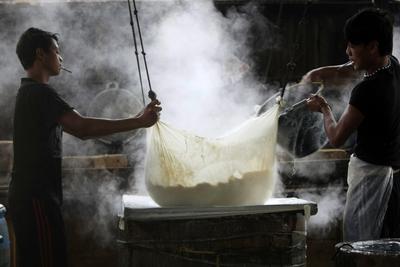Indonesia must not stop pursuing the economic reforms that it vows to implement.
Indonesia has had it easy in recent years. US quantitative easing meant lots of easy money flowed into emerging markets, and high commodity prices combined with high demand for its palm oil and coal from China led to an export boom. Unfortunately, Indonesia used this period to impose protectionist and inward-looking trade measures — like defending self-sufficiency policies in key agricultural products and restricting port entry of horticultural imports — which threaten food supply and are driving up inflation. Now Indonesia finds itself in a dangerous position with a widening current account deficit owing to a structural deficit in the oil and gas trade and weakening non-oil and gas exports. Higher growth has also been associated with higher imports.
So far, Indonesia has neglected every possible structural reform to address its supply-side constraints, including infrastructure, human resources and product innovation. Action in these areas could have increased economic capacity. For a long time than needed, the country had also neglected much-needed fiscal reforms to phase out its burgeoning fuel subsidies.
Indonesia’s domestic neglect has been exacerbated by its vulnerability to other countries’ monetary policies. While the G20 may be able to build an economic structure to coordinate monetary policy in the future, it has yet to do so.
So what can Indonesia do to keep its economy healthy in the midst of ongoing uncertainties over the US economic recovery and global macroeconomic outlook?
First, it is true that the market will always be looking to invest in countries with higher real yields, so Indonesia should expect that when US quantitative easing is ‘tapered’ and US yields rise, US money will return home. At the moment, it is unclear when the Fed will taper QE III but it could be as soon as October this year, depending on US employment data and other economic indicators.
Even so, market sentiments — which can be wrong in many ways — are still based on the fundamentals of an economy. To maintain confidence, Indonesia must focus on fundamental economic reform by implementing necessary structural reforms and maintaining a prudential regulatory regime. Get these things right, and Indonesia will have more ‘wiggle room’ to implement counter-cyclical fiscal and monetary policies in the case of external volatility shocks.
Second, the central bank and related agencies may balance the risk of foreign holdings by maintaining a healthy ratio of short-term foreign debt plus imports to foreign exchange reserves. The central bank and the financial services authority may also consider monitoring carefully the number of external financing positions including foreign ownership of its bonds, which currently stands at around 30 per cent, and diversifying the investment base by encouraging institutions to invest. These changes may also necessitate hedging government exposure to oil imports and/or commodity exports.
Third, the strong links between fiscal, monetary and financial sustainability mean the bureaucrats in charge of these sectors — the Ministry of Finance, the central bank and the financial services authority — need to communicate more effectively among themselves.
Indonesia needs a government policy response that is credible and transparent. This is the only way to boost investor confidence and market sentiment amidst uncertainties.
Maria Monica Wihardja is a former lecturer at the Department of Economics, University of Indonesia, and a former researcher at the Centre for Strategic and International Studies, Jakarta. She is also Associate Editor at the East Asia Forum Indonesia desk.

